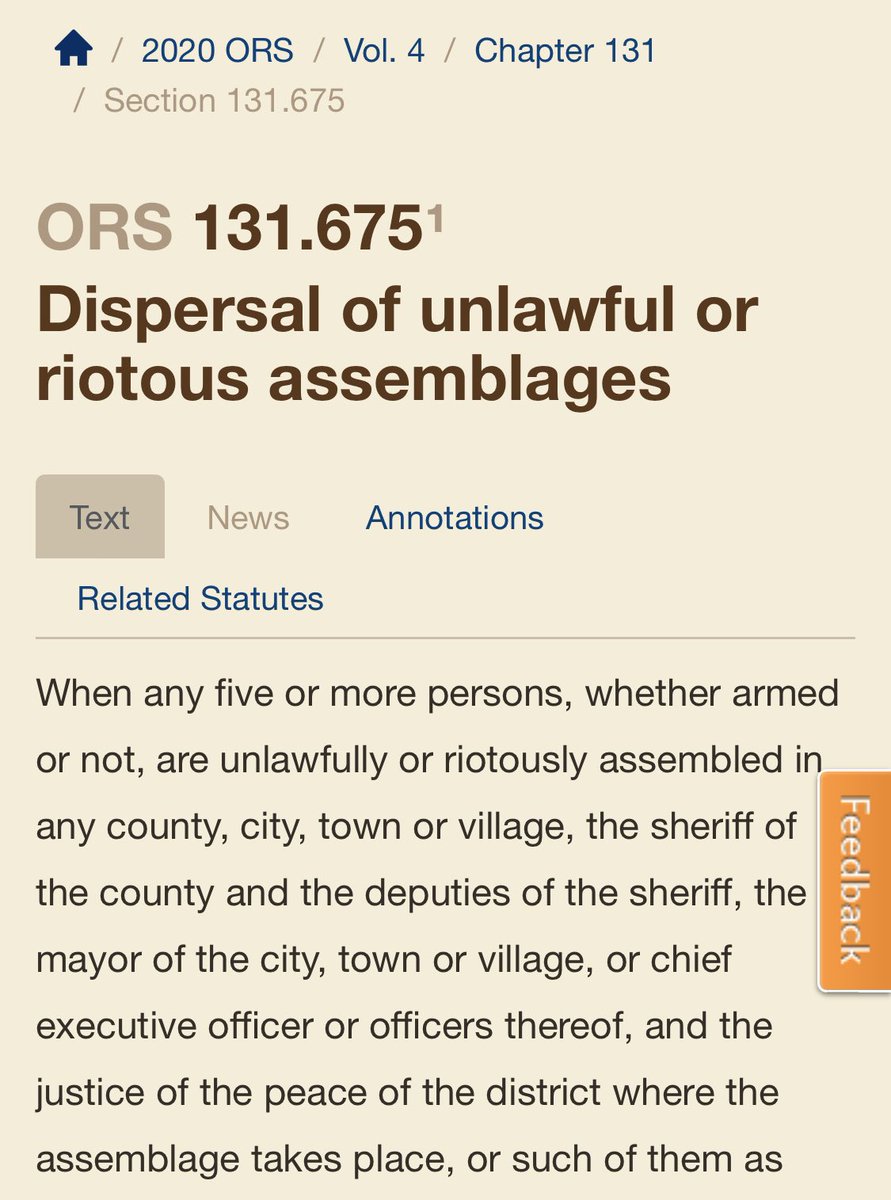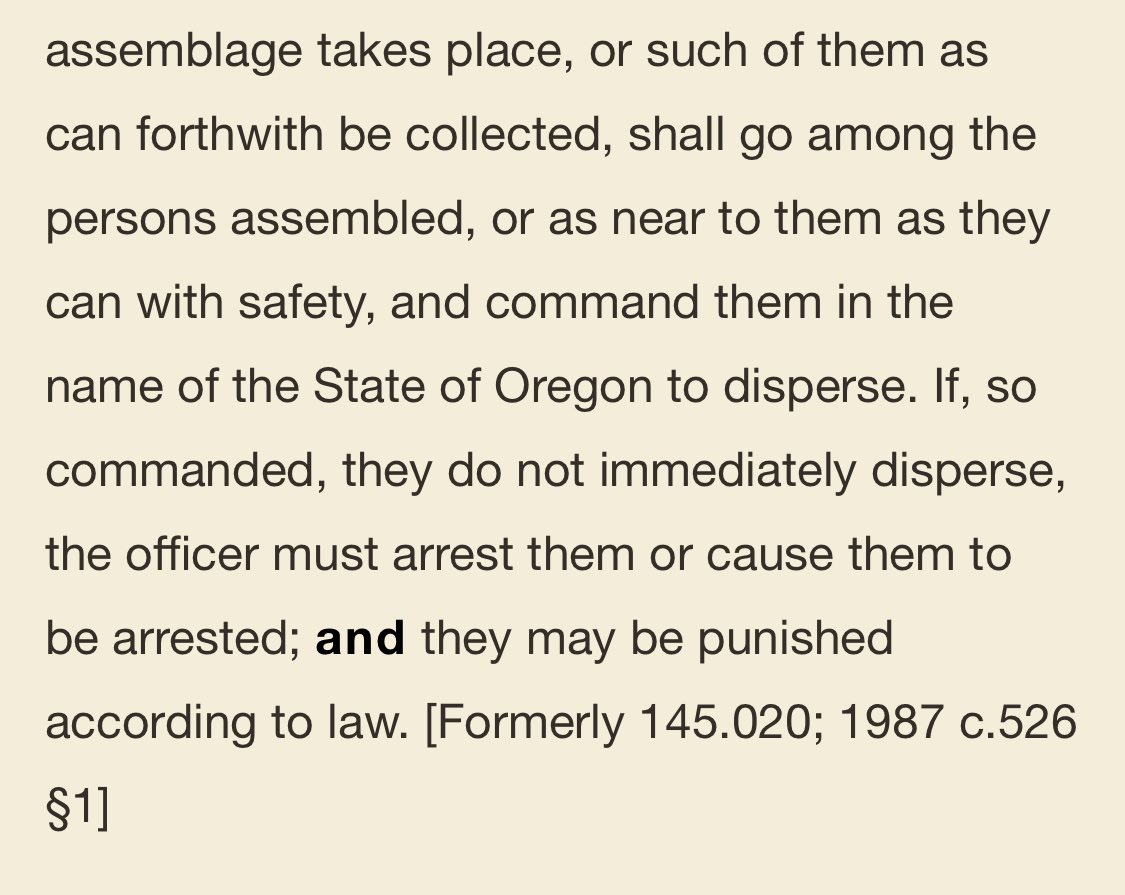This is both a simple and a deceptively complex question at the same time
Phrases like "illegal assembly" / "unlawful assembly" / "riot" have different meanings depending on the state, usually defined somewhere in statute, and then court decisions define the statute& #39;s terms
1/ https://twitter.com/razvenhk/status/1302701918427389953">https://twitter.com/razvenhk/...
Phrases like "illegal assembly" / "unlawful assembly" / "riot" have different meanings depending on the state, usually defined somewhere in statute, and then court decisions define the statute& #39;s terms
1/ https://twitter.com/razvenhk/status/1302701918427389953">https://twitter.com/razvenhk/...
So, e.g., Oregon has the crime of "riot," which is "while participating with five or more other persons the person engages in tumultuous and violent conduct and thereby intentionally or recklessly creates a grave risk of causing public alarm."
ORS §166.015
2/
@RazvenHK
ORS §166.015
2/
@RazvenHK
Then you& #39;d look to court decisions for explanation on what words mean in practice
For example, what is "tumultuous and violent" depends on how conduct viewed in whole would reasonably be perceived (State ex rel Juvenile Dept v Saechao, 2 P3d 935 (Or Ct App 2000))
3/
@RazvenHK
For example, what is "tumultuous and violent" depends on how conduct viewed in whole would reasonably be perceived (State ex rel Juvenile Dept v Saechao, 2 P3d 935 (Or Ct App 2000))
3/
@RazvenHK
That same case held that "participating with" other persons only means engaging in common disorder, not sharing of common purpose or intent
And so on
4/
@RazvenHK
And so on
4/
@RazvenHK
Then there& #39;s a separate statute empowering the police to disperse assemblies, at ORS 131.675
Here& #39;s the text
5/
@RazvenHK
Here& #39;s the text
5/
@RazvenHK
A group that& #39;s "riotously assembled" is pretty straightforward: it& #39;s a group of 5+ people engaged in the crime of riot as spelled out in ORS §166.015
6/
@RazvenHK
6/
@RazvenHK
Where it gets tricky is what constitutes a group "unlawfully assembled"; there doesn& #39;t appear to be a statutory definition for "unlawful assembly," so deciding whether a non-riotous assembly was unlawful would be up to the courts
7/
@RazvenHK
7/
@RazvenHK
Those state court decisions, in turn, are supposed to be bounded by federal protections in the First Amendment to our Constitution and court rulings interpreting it
8/
@RazvenHK
8/
@RazvenHK
So in theory, police are only declaring "an unlawful assembly" or "a riotous assembly" when they think they have proof of conduct that meets the definition of each one – either defined in the state& #39;s statutes or as spelled out by the courts
9/
@RazvenHK
9/
@RazvenHK
In practice, police declare unlawful / riotous assemblies whenever they want
Anyone they arrest as part of refusing to disperse would then argue to the court during their criminal trial that the assembly was not unlawful / riotous
10/
@RazvenHK
Anyone they arrest as part of refusing to disperse would then argue to the court during their criminal trial that the assembly was not unlawful / riotous
10/
@RazvenHK
If you& #39;re unlawfully dispersed? The courts say "LOL too bad. Go f*ck yourself."
If you& #39;re wrongly prosecuted? The courts say "LOL too bad, I found you & #39;not guilty& #39; that& #39;s good enough. Go f*ck yourself."
11/
@RazvenHK
If you& #39;re wrongly prosecuted? The courts say "LOL too bad, I found you & #39;not guilty& #39; that& #39;s good enough. Go f*ck yourself."
11/
@RazvenHK
That, in turn, leads to more police abusing their power more often because they know they& #39;ll never be held accountable for abusing it
As cops say, "you might beat the rap but you can& #39;t beat the ride"
12/12
@RazvenHK
As cops say, "you might beat the rap but you can& #39;t beat the ride"
12/12
@RazvenHK
That& #39;s the job of the "finder of fact": the judge in a bench trial, or the jury in a jury trial
The prosecutor presents evidence showing you were engaged in the activity; the defense either argues that& #39;s insufficient, or presents evidence showing you weren& #39;t
Factfinder decides https://twitter.com/johnkramarz/status/1302805543237476353">https://twitter.com/johnkrama...
The prosecutor presents evidence showing you were engaged in the activity; the defense either argues that& #39;s insufficient, or presents evidence showing you weren& #39;t
Factfinder decides https://twitter.com/johnkramarz/status/1302805543237476353">https://twitter.com/johnkrama...
Oregon& #39;s courts have held that& #39;s not unconstitutionally vague because "alarming public in general requires that alarm be objectively reasonable response to conduct" (State v Chakerian, 900 P2d 511 (Or Ct App 1995), aff& #39;d 938 P2d 756 (Or 1997)) https://twitter.com/peacefinder/status/1302807991977082880">https://twitter.com/peacefind...
Sort of: rather than them being "found" by a theoretically neutral third party, they& #39;re found by the judge based on the Defendant& #39;s admission
It& #39;s part of why vacating guilty pleas of actually innocent people is procedurally harder than vacating guilty verdicts https://twitter.com/lennyliebmann/status/1302807846590058498">https://twitter.com/lennylieb...
It& #39;s part of why vacating guilty pleas of actually innocent people is procedurally harder than vacating guilty verdicts https://twitter.com/lennyliebmann/status/1302807846590058498">https://twitter.com/lennylieb...
For anyone criminally charged, there& #39;s no reversal: you& #39;re still presumed innocent, and (theoretically) can only be found guilty if the Government presents proof beyond a reasonable doubt that you rioted
On the civil side, you& #39;re 100% right...
1/ https://twitter.com/rickmagill54/status/1302806717609193473">https://twitter.com/rickmagil...
On the civil side, you& #39;re 100% right...
1/ https://twitter.com/rickmagill54/status/1302806717609193473">https://twitter.com/rickmagil...
...and that& #39;s part of why people are so pissed about things like qualified immunity
The original idea was that if the Government violated your rights – dispersed your assembly even though it wasn& #39;t acting unlawfully – you& #39;d sue the Government and be made whole
2/
@rickmagill54
The original idea was that if the Government violated your rights – dispersed your assembly even though it wasn& #39;t acting unlawfully – you& #39;d sue the Government and be made whole
2/
@rickmagill54
But the courts instead fabricated the doctrine of qualified immunity from scratch, to protect cops from the consequences of their own bad decisions
So now if the Government violates your rights, and you sue, the Court says "better luck next time"
3/3
@rickmagill54
So now if the Government violates your rights, and you sue, the Court says "better luck next time"
3/3
@rickmagill54

 Read on Twitter
Read on Twitter



